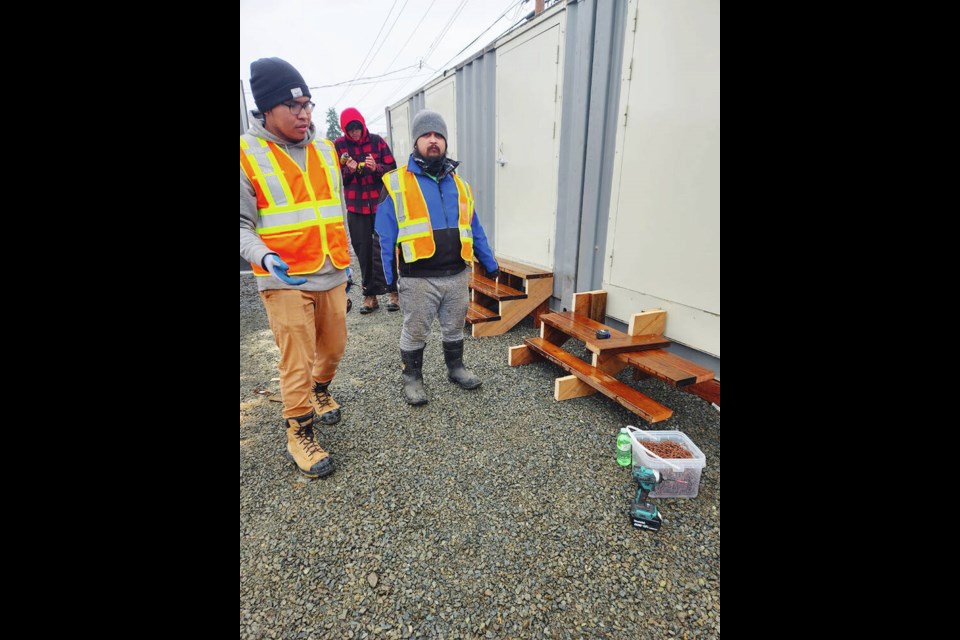Despite chilly temperatures, work is underway in Port Alberni to complete 91ԭ�� Island’s third tiny home village to serve people without homes.
The Watyaqit Tiny Home Village in Port Alberni follows the Tiny Town Village in Victoria, which opened in May 2021 in the parking lot of Royal Athletic Park, and the Village in Duncan, which welcomed residents in February and March of this year.
The Port Alberni Friendship Centre, which is spearheading that city’s new village, has leased a three-lot site at 3675 Fourth Ave. for two years from the City of Port Alberni, a project partner along with B.C. Housing.
Municipal support included providing sewer and water services and installing a fence.
The project is about far more than providing shelter, said Cyndi Stevens, executive director of the Friendship Centre. She who said it’s about creating homes where people feel cared for and respected.
“We want them to have hope that people believe in them, that they are surrounded by support and that they will be able to meet their goals.”
Watyaqit means “to be at home,” in Nuu-Chah-Nulth, said Stevens, adding the goal is to foster a sense of community and purpose among tenants. “We don’t want them to feel like they are just going to be stuck in their home. You want them to feel like they can make a difference.”
The original plan was for the village to open in October, but the need for extra work, along with higher costs, moved the opening date to February, when 20 homes are expected to be in place, followed by another 10 at a later date.
Some of the extra costs stemmed from insurance, choosing suitable pre-fab homes and producing a building code compliance report for the city, she said.
Right now, Stevens is watching the weather, hoping snow will not get in workers’ way.
The insulated and heated 12-by-eight-foot homes are manufactured on the Lower Mainland and will be assembled on site.
North Island College carpentry students enrolled in a Nuu-Chah-Nulth employment and training program have spent close to a month getting work experience on the property, building bases for the homes and constructing stairs.
Each house will have a bed, bedding, table and other furniture. There will be laundry facilities, washrooms and showers in other buildings and a bike lock-up as well.
Residents will be allowed to have one pet each, Stevens said.
The site includes an office, common areas, outdoor seating, and there are plans for community gardens. Daily activities will be offered.
Support workers have been talking to residents in nearby rundown trailers hoping they will apply for a place. Tenants will be selected through a committee process.
The village will be staffed around the clock, Stevens said.
This housing is intended to be semi-permanent, she said, with tenants to be eventually transitioned into low-barrier permanent housing. The goal is for that low-barrier housing to be built within two years in the city.
The future of the village was in question a couple of months ago because of financial concerns, but it’s believed that B.C. Housing will be investing in the Port Alberni project. B.C. Housing would not confirm that.
The Village on Trunk Road in Duncan has slightly larger units and homes for just over 30 people. The Cowichan Housing Society was the project proponent and Lookout Housing and Health Society manages the village.
Tenants have been employed to work in the neighbourhood to do walkabouts, collect garbage, pick up needles and talk to business people about any concerns.
Shelley Cook, executive director of the housing society, said tenants are healthier, connecting with their families and entering treatment. The Village was funded through a $2-million grant from the Union of B.C. Municipalities, after the District of North Cowichan applied on behalf of the organizers.
B.C. Housing will fund operating costs between Dec. 1 and the end of May, when its temporary unit permit for that location expires, she said.
The housing society is looking at all options after that, Cook said. That includes moving some current Village tenants into a new supportive housing project expected to be completed by the end of May. The Village itself may be relocated. Long-term funding has not yet been lined up.
Cook emphasized that a number of agencies are working collaboratively to deliver services to Village residents.
“It really takes a community to operate a village,” she said.
>>> To comment on this article, write a letter to the editor: [email protected]



